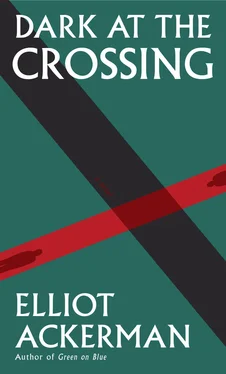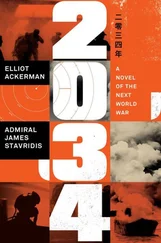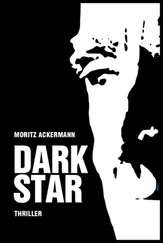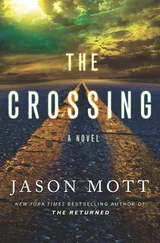With his face pressed to the tarpaulin’s seam, Haris watched the shivering flames reflect in the black flood and in the shattered windshield of a white Peugeot, its front crushed against a collapsed telephone pole. All four of its doors had been knocked open, and it was the same model as Amir’s. They drove closer and the fires burned brighter, revealing a constellation of bullet holes running up the car’s hood and the bodies of men flopping out from every door. The dead, frozen in their last actions, each of their poses different, but their final, most simple purpose shared — get out of the car.
Their truck lurched hard, taking a dogleg. Haris jostled against the others in back. A few tumbled from their seats, patches of light falling against their faces as they cursed the driver. Then, at this bend in the road, they stopped.
Those in back looked toward one another, searching for some assurance as to why they weren’t moving. Concerned stares passed among them, uneven as the flickering light which crept inside through the tarpaulin’s seams. Finding no assurance in each other, most everyone in the bed strained to look outside.
So did Haris.
Set up at the bend in the road was a checkpoint — three men standing by an empty fifty-five-gallon diesel drum with a single strand of concertina wire blocking Route 214. A fire burned in the drum, its flames lapping at the rim. The men warmed their hands over the flames, rifles slung from their shoulders, their packs piled by their feet. They wore a mix of camouflage uniforms, some plain olive drab, some an oblong design of black, green and brown, and some in the American pixelated pattern. Their full beards hung from their cheeks like weights, hollowing out their eyes. And these eyes looked at the road but not the truck which had borne down on them. Up the road, just where the flames receded back into darkness, a dead dog lay by a blast crater. The speckled pattern of the explosion fanned out into the brittle macadam and across the dog’s body, where it had bitten hunks of fur and flesh from its stomach. Gathered around the corpse were three cats, the same number as the men. The cats ate the dog, picking at its entrails with their nimble mouths. From time to time, when the cats fought over the most succulent portions, Haris could see the men laughing as they watched, their teeth white in the night.
The truck idled in front of the concertina wire. The passenger door opened, and Athid grabbed the large side-view mirror, swinging down to the running board, then hopping onto the road. He glanced at the dog but walked by, choosing to ignore it. He approached the three men. Instead of shaking hands, they held each other at the elbow in a half embrace, touching their temples together, as one would kiss cheeks, but instead they nuzzled like deer in the forest, this being the most intimate greeting.
Over the noise of the idling engine, Haris couldn’t hear what they said. Athid seemed to ask the soldiers questions, gazing past their checkpoint and down the road. All three answered in unison, seeming to tell him what lay along this narrow ribbon of darkness, which connected Azaz to Aleppo. Haris hoped their knowledge of regime checkpoints and patrols was accurate, but beyond hope there was little else he could do. Then, as he and the men seemed to finish discussing the road, Athid called back to the cab. Jamil stepped outside and jogged over, doing his best imitation of an earnest soldier.
As Jamil stood rigidly in front of the group, Athid spoke forcefully to the three, issuing some sort of order. At first the men milled around the fire, their sidelong stares resting skeptically on Jamil. Then one of the men bent down, digging through his pack. He took an olive-green tunic from it, thick and worn as a painter’s smock. He bundled it in his hand and shot it quick and hard at Jamil, who caught it. Holding up the tunic, Jamil gazed back at Athid, who nodded as if he should put it on. Watching Jamil dress in this, his first uniform, Athid smiled and tousled the boy’s well-combed hair. Jamil matched Athid’s smile with his own. The three men kept their eyes fixed to the fire.
The hushed complaint of morning birds came from the east, across an inky void of barren fields. Hearing the birds, the three men dug through their packs, removing prayer rugs, which they unrolled on the bare earth. Coming to their knees in the darkness, they made their prostrations, touching their foreheads toward the breaking day. Jamil took his place among them, but without a prayer rug he knelt in the dirt. Next to him, Athid did the same. Jamil glanced over at Athid and, noticing the manner in which these soldiers prayed, he mimicked them, extending his fingers toward Mecca.
Inside the bed of the truck, no one prayed. They watched each other.
“These Islamists will die with their hands pointing the way.” The farmer’s voice awoke his daughter. Cradled in her mother’s arms, she began to cry. The girl seemed inconsolable, her breaths coming in tiny, hyperventilated huffs. Her mother swayed her from side to side, clutching her to her breast. The tighter she held her, the more she cried.
Sitting across the bed, among the ten or so other travelers, Daphne leaned forward. She reached into the satchel draped across her shoulder, setting Bashar in the girl’s lap. At first the girl writhed away from the pup, frightened by it, clutching her mother even tighter. Then Bashar leapt up, licking her face.
The truck bed filled with the girl’s laughter.
“I used to teach children her age,” Daphne explained to the farmer’s wife.
As the girl laughed, the three men on the checkpoint rolled up their prayer rugs. They went back to standing beside the fire burning in the fifty-five-gallon drum. Athid joined them, having ordered Jamil to return to the truck. One of the men pulled back the single strand of concertina, clearing the route toward Aleppo, a half hour’s drive farther.
As Jamil wandered back without Athid, his stare fixed on the dead dog just up the road. He jogged over to where it lay, kicking off the cats, which still hunched over the rotting carcass, scavenging. Then Haris noticed the men on the checkpoint, including Athid. They all shot Jamil resentful looks for disrupting this, their only entertainment.
Jamil took his seat up front. Then the truck lurched into first gear, making its way south. And the driver veered slightly toward the road’s shoulder, crushing the dog beneath its wheels.
—
The checkpoint slippedbehind the rear horizon and Aleppo had yet to form ahead. The farmer’s daughter calmed. She sat on her father’s knee, facing him, holding the pup in her lap. To occupy her, he’d taken the packet of seeds from his pocket, allowing her to run her fingers through the coarse grains inside. As she did, he explained how precious the seeds were. She seemed to understand, continuing to stare into the packet with calm fascination.
“You’re a big girl, yes?” said the farmer.
She nodded.
“Then you hold these seeds until we return.”
The farmer’s wife protested, but he ignored her. Being trusted with something important would teach the girl a valuable lesson. He slid the envelope into the pocket of the homespun dress his daughter wore, buttoning its top. The little girl rested her hand there, not moving it.
The farmer gazed back at Haris, who watched. “It’s a great responsibility.”
Haris couldn’t tell if he meant the packet of seeds or raising a child.
“Do you have any children?” he asked.
Haris shook his head, and the farmer frowned.
“And you?” he called across the bed to Daphne.
She had clamped her eyes shut, pretending to sleep.
The farmer leaned forward, tapping her knee. “Do you have any children?” he asked again.
Читать дальше












